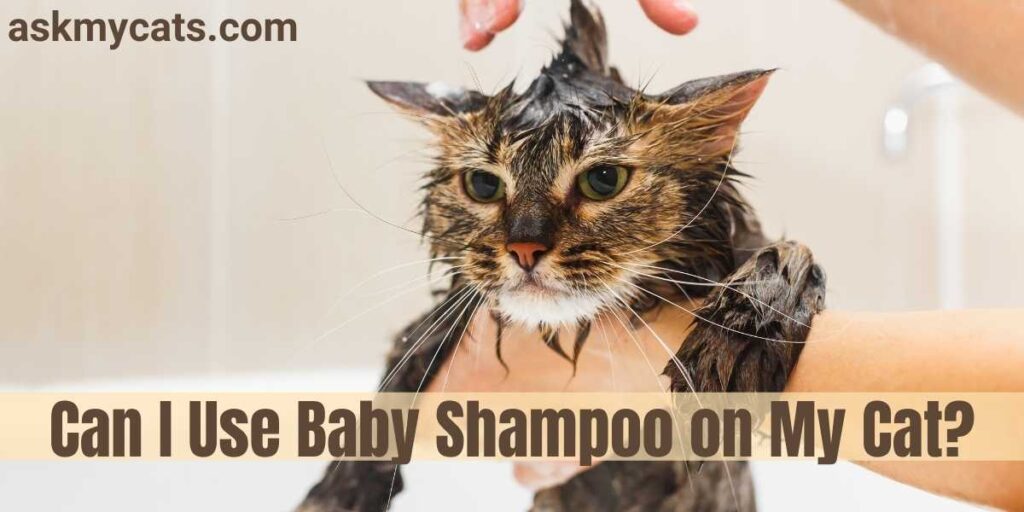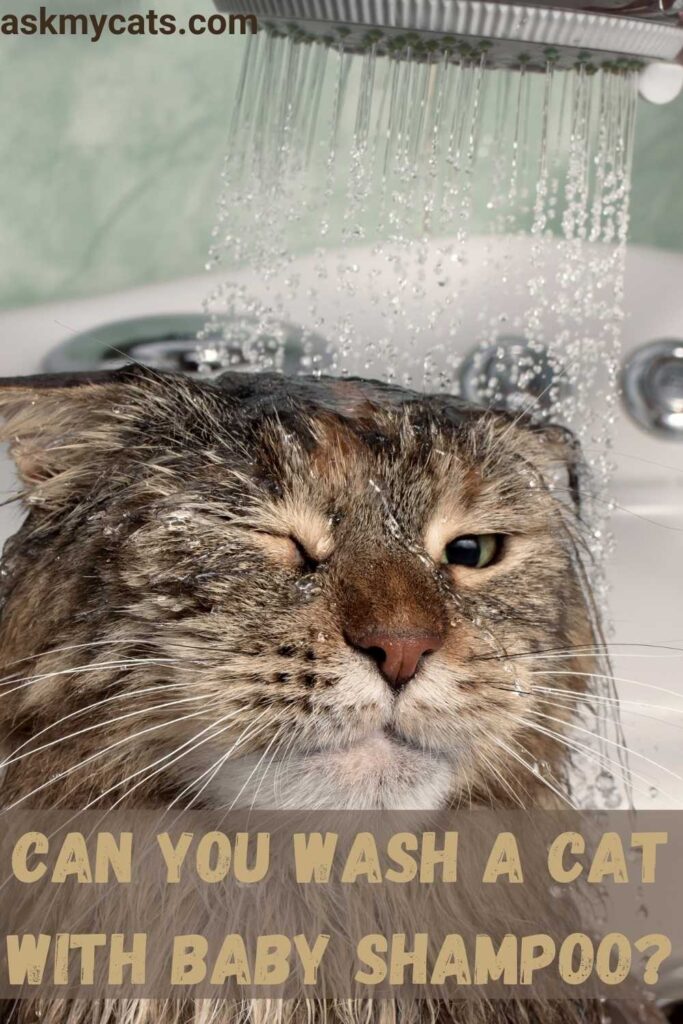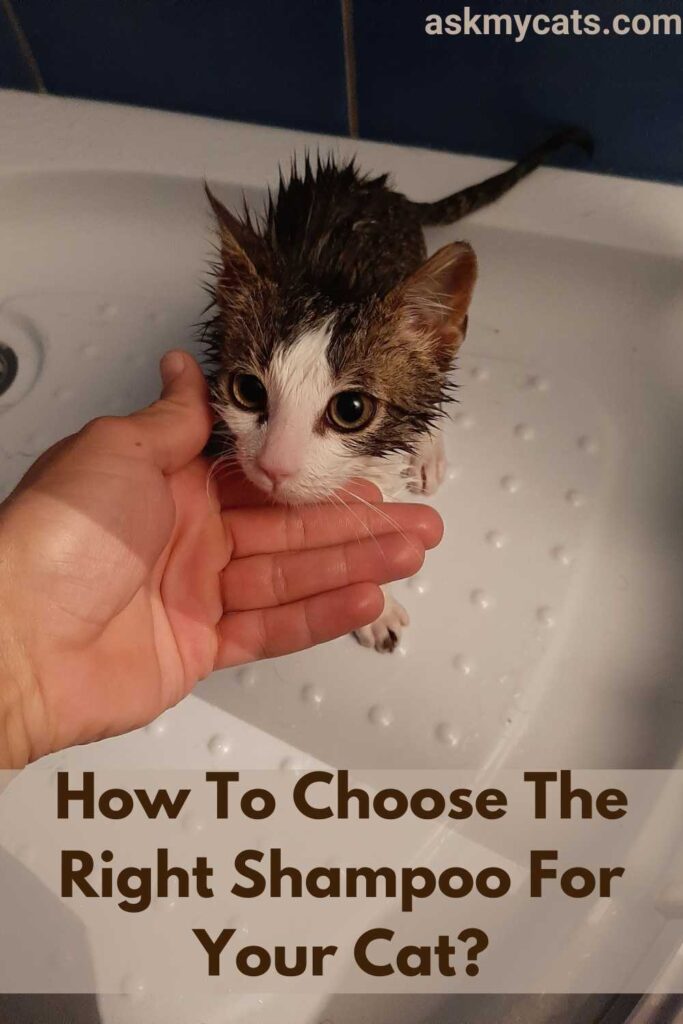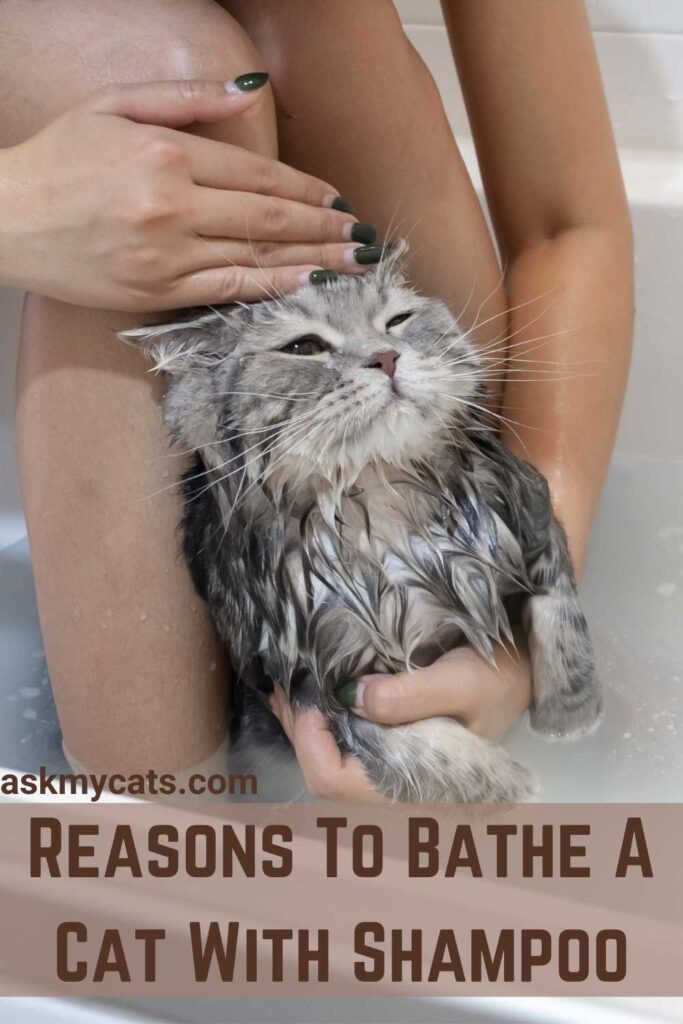Since a baby’s skin is so delicate, most baby shampoo producers choose the softest, gentlest components to prevent them from allergic reactions.
Similarly, a cat’s skin is sensitive, which is why you may have pondered if you can bathe your cat with baby shampoo.
So, can you use baby shampoo on your cats?
Yes, you can use baby shampoo on your cat. It is, however, not optimal or encouraged. This is due to the fact that cats do not require a bath until they have become excessively filthy. There is also a shampoo specifically created for them that is considerably safer.
This article will tell you all about if you should bathe your cat with baby shampoo or not and what are its effects.


Give Your Cat the Perfect Day
Get the Free Ebook!
Can You Wash A Cat With Baby Shampoo?
Yes, you can wash a cat with baby shampoo, however, it is not recommended.

Yes, you can use baby shampoo on cats, but only if you don’t have any cat shampoo on hand.
Cat shampoo is and always will be the greatest grooming product for cats because it is exclusively developed for them.
To be clear, baby shampoo is acceptable but not particularly recommended.
If you must use baby shampoo, make sure it is fragrance-free and ph-balanced.
Despite the fact that baby shampoo is usually fine for cats, there is a better option.
Baby shampoo, on the other hand, is made for babies, not cats. It’s fine to use occasionally, but cat shampoos are a better alternative because they’re specifically designed for cats.
The majority of cat shampoos contain all-natural components that clean and moisturize the skin and fur of cats. Another advantage is that most cat washes do not wash off topical flea treatments.
Cats have different skin than humans and hence have different needs. You can observe that a cat’s balanced pH levels are more neutral, ranging from 6.39 to 6.64 depending on where they live.
Human skin, on the other hand, has a much lower pH balance, which is more acidic and averages less than 5.
Even while baby shampoo is gentler and less harsh than conventional human shampoo, it is still not suitable for cats.
Bathing your cat with baby shampoo will most likely upset the pH balance and the acid mantle, which is a thin layer of skin that prevents viruses and bacteria from infecting it while also keeping it hydrated.
If you need to wash your cat’s fur on a frequent basis for medical or other reasons, talk to your vet about the best option for your cat.
Interesting Read: Can I Bathe My Cat In Winter?
Can I Use Baby Shampoo On My Kitten?
Yes, you can use baby shampoo on your kitten, but not on a regular basis.
Adult cats are usually adept at cleaning themselves, but kittens may require assistance. Cats maintain themselves healthy by keeping their coat clean, but because kittens are less meticulous, their cat owners are responsible instead.
“Dirt, bacteria, and residual food residue can cause skin illnesses in newborn kittens called pyoderma,” according to AHS shelters.
A warm wash may be necessary because kittens can be messy with food and their litter box, but baby shampoo should be the final option for a grooming product.
Kittens are just as delicate as adult cats, if not more so, which is why it’s critical that the shampoo you use has been recommended by your veterinarian.
Hypoallergenic and fragrance-free baby shampoo can help if you’re out of options and it’s an emergency, but you can’t use it on a regular basis.
Must Read: Do Cats Get Dandruff In Winter?
Can I Use Johnson’s Baby Shampoo On My Cat?
Yes, you can use Johnson’s baby shampoo on your cat, although, it is not scientifically proven that it is safe for cats.
Baby shampoos are available from a variety of manufacturers. Johnson & Johnson is perhaps the most well-known, and they own the registered trademark “No More Tears,” so it’s the first one that comes to mind.
I can’t say which shampoo is the best without trying them all. Particularly when it comes to using it on a cat, which isn’t even the shampoo’s intended use.
They certainly make a lot of boasts about their shampoo being one of the most gentle and gentle on the market for babies. Give this brand a try if you have it at home.
Is Baby Shampoo Safe For Cats?
No, baby shampoo will not hurt cats, if used rarely and it also depends on what brand of baby shampoo are you using.
Which one you use makes a difference. If you use an unscented shampoo, the risk of irritation is reduced, and the alkaline level is closer to that of a cat. As a result, your cat’s skin is less likely to be irritated.
There are also other soaps that have been reported to be used with cats, such as castile soap. This soap is considered to offer additional moisturizing properties, which will prevent your cat from drying out.
The ideal solution, however, is to use cat shampoo, which is made exclusively for feline needs.
Difference Between A Baby Shampoo And Cat Shampoo
The following are the differences between a baby shampoo and a cat shampoo: –
| Baby Shampoo | Cat Shampoo |
|---|---|
| While baby shampoo or even other human shampoo is deemed acceptable for cats, it should not be used on a regular basis. Even if it has gentle formulae, it may still contain parabens, sulfates, and colorants that are damaging to your cat’s skin and health. | Cat shampoos, on the other hand, are designed specifically for cats. It keeps their hair healthy and lustrous while avoiding aggravating their sensitive skin. |
| Baby shampoos are made by keeping in mind the PH level of human skin which is around 5.5 and acidic in nature. | Cat Shampoos are made by keeping in mind the PH level of the cat’s skin which is around 7.5. To avoid allergies and irritations, your pet cat should only use a shampoo that is appropriate for their PH level. |
| Human Shampoo contains many chemicals in order to achieve diverse goals, such as coloring, eliminating dandruff, and stying, they contain chemicals and compounds that are harmful to cats. | Like human shampoo, cat shampoo has cat-friendly components and less harsh chemicals. |
Why Is Cat Shampoo Better Than Baby Shampoo?
Cat shampoo is better than baby shampoo because it is designed to align with the PH level of your cat, which is higher than humans.
Baby shampoo may appear to be an excellent choice for bathing your cat; after all, if it’s gentle enough for babies, it must also be gentle enough for cats, right?
Although baby shampoo is soft, it is made for the skin of newborns, not cats. Our skin’s pH is roughly 5.5, and infant shampoo is made to match that level to prevent irritation and dryness.
Your cat’s skin, on the other hand, has a pH of around 7.5, making it more alkaline. Using a shampoo with a more acidic pH than your cat’s skin, such as baby shampoo, might cause dryness, and itching, and make your cat feel less comfortable than before you gave them that bath.
Interesting Read: Can You Bathe A Pregnant Cat?
How To Choose The Right Shampoo For Your Cat?
When choosing the right shampoo for your cat look at the ingredients. You want to avoid ingredients with synthetic and artificial ingredients like: –

- Alcohol
- Parabens
- Phenol
- Permethrin
- Pyrethrins
- Pyergroids
Instead, seek cat shampoos that have natural components like aloe and lanolin rather than chemical additives.
Look for shampoos that are fragrance-free, as fragrances might irritate your cat’s skin.
If your cat suffers from any skin issues, such as dryness, check for shampoos that address these issues.
Four Paws Magic Coat Cat Tearless Shampoo is an excellent choice. It has a mild mix of protein and lanolin that is suitable for all coat types.
Earthbath All Natural Cat Shampoo is another excellent option. It’s a two-in-one cat conditioner that’s especially good for sensitive skin.
This would be a fantastic alternative if you have a long-haired cat because it is also designed to treat tangled fur.
Reasons To Bathe A Cat With Shampoo
Reasons to bathe a cat with shampoo are: –

1. Flea Infestation
Fleas will jump on your cat’s fur if given the chance, and it won’t take long for them to start their own family in this cozy setting.
While any flea and its colony would love to live on your cat, it’s not a good idea for your cat.
They not only itch, but they can also carry a variety of diseases.
“In fact, these small, wingless insects often carry infectious agents themselves, such as tapeworm eggs and a range of pernicious bacteria—including the one that causes feline infectious anemia—which can be spread among cats in close physical contact,” according to vets.
2. Dirty Coat
Cats are natural explorers, and this trait can result in filthy fur covered with cobwebs or worse. Of course, they have the ability to clean themselves, but some substances are harmful to them.
Cats who go outside their home accidentally or because they’re allowed to be outside can get into sticky situations, such as getting soaked in gasoline or motor oil stains.
It’s critical to give your cat a bath and thoroughly clean their fur in situations like these. Cat shampoo can assist dissolve a sticky substance while also ensuring that the coat is clean, healthy, and odor-free.
3. Medical Reasons
Another reason a cat might require a bath is if they are unable to clean themselves. This is frequently found in senior cats.
Cats, like people, can have aging-related illnesses that alter their behavior as they grow older.
This implies that your cat may be less likely to groom itself, leading to “hair matting, skin odor, and irritation.”
Because fat cats and cats with arthritis may have difficulty moving around, they may also have difficulty keeping their coat clean.
Cats who are easily stressed may also dirty themselves, or a healthy feline may accidentally step into their own mess.
A decent and meticulous bath can help you turn a stinky cat into a gleaming fluffball, regardless of the conditions.
4. Breed Of The Cat
Finally, a cat’s demand for a bath may be related to its breed or, more precisely, the sort of coat they have.
“Periodic baths are indeed needed in order to remove body oils” for cats that don’t have fur, such as the Sphynx.
Long-haired cats, on the other hand, may find it difficult to groom themselves, particularly in the back.
Maine Coon cats are known for their long coats and their love of the outdoors, so it’s no surprise that they require regular maintenance, and a bath every now and then could help them maintain their smooth, silky coats!
Frequently Asked Questions
Can I use any shampoo on my cat?
No, absolutely not. First and foremost, I would not recommend using standard adult shampoos. If used on a cat, these contain far stronger cleaning chemicals than infant shampoos and can cause major skin irritation. Instead of conventional shampoo, I recommend using simple water. If you can’t get the dirt out of your cat’s coat and you don’t have anything else, you might have to wait until the morning to go to the store. The same can be said for shampoos designed specifically for other animals. Dogs and other pets have significantly diverse pH levels, different coats, and various shampoo requirements.
Is it essential for cats to take a bath regularly?
Cats, in general, should only be bathed once in a while because they self-clean. They shouldn’t take baths very often because they have sensitive skin and the natural oils will be stripped away. Bathing the cat on a regular basis might also dry out the fur or hair.
At what age can you bathe a kitten with shampoo?
Before bathing a kitten, you should wait at least four weeks. It is not advised prior to this. After then, any tie is ideal. The bath will be beneficial to your kitten. Especially if they are dirty and unable to groom themselves as a result.
Final Words
Although your cat may dislike getting wet, bathing them on a regular basis is essential to their health and well-being.
While baby shampoo is typically acceptable, it is recommended that you use cat shampoo when bathing a cat.
There are a plethora of pet grooming products on the market to select from, each with its own set of advantages for keeping your pet cat well-groomed, clean, and healthy.
If you have any questions, ask us in the comments section.
